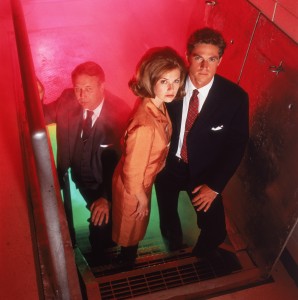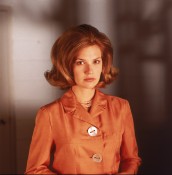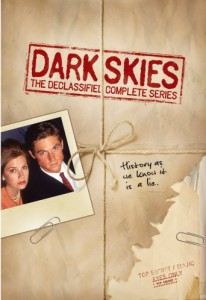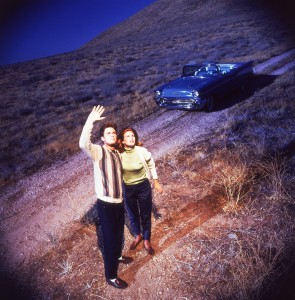When THE X-FILES hit it big in the 1990s, all the other networks were looking for their own science-fiction series to rake in a loyal fan following and a ratings bonanza.
One of the best was NBC’s DARK SKIES created by Bryce Zabel and Brent V. Friedman. It only last one-season, but its rich mythology and feature-film qualities made it a stand-out (Tobe Hooper even helmed the pilot). The story was set in the 1960s and followed John Loengard (Eric Close) and Kimberly Sayers (Megan Ward) as they were called into action by the government to take down an unseen alien takeover on earth.
The hook with the show – all the history we’ve been told since that first Roswell, New Mexico crash landing of a “reported” spacecraft has been a lie and alien activity has dictated modern history ever since then (with ample government cover-up assist along the way).
The new, long-awaited DARK SKIES: THE DECLASSIFIED COMPLETE SERIES finally brings the series to DVD and since this is Shout! Factory, it’s filled with loads of bonus features including a three-part featurette on the series with the cast and creators, the original Season 2 proposal, the international pilot, commentaries and more.
ASSIGNMENT X recently spoke with actress Ward about her time on DARK SKIES in this exclusive interview.
ASSIGNMENT X: The original pilot felt like nothing on TV at the time. It looked like a movie and it was phenomenal what [director] Tobe Hooper pulled off. Plus, the series itself still works.
MEGAN WARD: I think so much of the show is rooted in story, not the dazzling visual effects. Even though the effects are more advanced now, the actual storytelling is completely on par with anything being told today.
AX: Did you believe there was any kernel of truth to this alternate timeline?
WARD: I don’t feel like I need to know the answer. I still feel the same way about extraterrestrial life I did before, I think it’s completely possible. To take a scenario and put pieces together to create a thesis of “this could have happened” – that fascinated me. Putting the pinpoints in there and to show a different perspective of why or how an actual event happened, that to me was so fascinating especially since Bryce and Brent’s minds were able to work that way and to articulate it on the page. The ganglions, the Hive, what the spaceship looked like – that’s the superficial stuff. It’s more about the idea of it and the possibility of it and the possibility of the government covering it up. I completely believe the government knows things that they don’t tell us like Area 51 –so why not. I’m fascinated by conspiracy theories, more about the existence of them, than what the theories are about. It’s almost like a mystery or a puzzle and that’s what you do as an actor when you tell stories. You put these pieces together to form a complete puzzle. I just love they were able to do that.
AX: The show definitely could make you paranoid that there was more going on than you were aware of things – particularly as years have gone by. Do you ever find yourself thinking, “Brent and Bryce were right!”
WARD: I’ve always been a bit paranoid about that stuff too. In a way, it’s almost like a public service announcement. The truth is, something is out there, people are out there. They may not be aliens, they may be the government. All that stuff is totally true – surveillance stuff and the ability to be exposed. There have been lots of stories, different sort of films or books since that, which took the angle of what our private or public existence really is.That stuff, I have to put my finger in my ears, otherwise I could never leave the house. All that information is so frightening, but it’s also the best storytelling stuff. It’s what good stories are made of. DARK SKIES really had it all. On paper, it was all there. There is a magic to making things happen, and generally it has to do with who is making the decisions and the magic of having the right people behind you. You have to do so much to make the project good and hope that the timing is right and all that other stuff works out. On paper, DARK SKIES had every angle of good storytelling which is why I think it holds up.
AX: Why do you think the show didn’t work on NBC?
WARD: It was an expensive show. I think the decisions are often made at the bottom line about cost and production and someone’s favorite project taking its place and availability of time slots. There are subjective opinions in crafting a prime time schedule, and I’m not sure whose decision it was, but there were a lot of things on the plate when it came to DARK SKIES. It was a very complicated, expensive show. It really was a show that was ahead of its time. Simpler, single-purpose shows are much easier to produce and run in syndication. Unfortunately, those are the things that creative people like Brent, Bryce and I are victims to in some degree. We were just trying to make a really good product and tell a really good story, but, there is a whole other marketing strategy – a business bottom line and a business calculation that generally makes decisions about shows. Bryce would be better at telling you about what went down, but I think the show was too much ahead of its time. It needed tender loving care and it needed a lot of support and it wasn’t the right time for it.
AX: Have you had a chance to look at the box set?
WARD: I watched a bunch of shows before we did the commentary, but it’s hard to watch them because half of the time I’m like, “oh, look at how good it was” and then I’m like, “ahhh, it’s a shame we didn’t have a second season.” And then I was like, “Oh, I wish I could change that, or did I look like that?” It’s a difficult thing to watch yourself in something you invested yourself greatly in and we had bittersweet feelings about. It didn’t have the best ending, the way it ended, but it still is fantastic that I got to do it and it existed. It’s tricky to look back at your own work.
AX: I always thought that was a great twist when your character became part of the Hive. Was that something you knew was going to happen at some point or did it evolve that way?
WARD: That was a fairly complicated situation. I think there are several reasons why that happened. I think the show started off one way and I think there were opinions about what the show should be. That choice was part of that. As an actor, it was a little frustrating. I didn’t want Kim to leave the canvas and not be present in the story. As a storyteller though, it was fantastic, because how tragic is it that Kim, who is the most human of all characters on the show, ends up giving up her child for the Hive. It’s a tragedy. It breaks my heart when I looked at those scenes. It was so sad and I remember how difficult it was. It wasn’t an intuitive choice. It wasn’t a natural thing. It was very abstract. A lot of what Kim had to do for the end of the show was very abstract and those were hard things to do, these cerebral ideas of our characters relating to an alien. That’s not rooted in anything I can remember in my past or something I’ve personally experienced or I can reference. In the pilot where I coughed up the ganglion – thinking back and forth and being controlled by this other creature is really hard stuff to perform as an actor and because of all of that stuff, I bonded with her. I really liked Kim and believed in her and that she would come back. It might be a long battle, but she would come back and get her son back.
AX: Did they talk about, if there was a second season, where your character would have gone?
WARD: The show really did change from the beginning to the end. When you left her, the last time you saw Kim, she was with [Jim] Steele [played by Tim Kelleher] who was essentially [going to become] Manson and Kim was going to be Squeaky Fromme. It didn’t look good for Kim. Obviously, I had sort of imagined, “this is going to be great, this will be dark, she’ll change identities again.” I thought all the fun stuff we could play with Kim vs. John, but I had no indication. I think Brent and Bryce knew that it was over. There’s a certain cut off point when you know you’re not going to get another season. It felt like the show might be ending. Everyone felt like that.

J.T. Walsh, Megan Ward and Eric Close in DARK SKIES: THE DECLASSIFIED COMPLETE SERIES | ©2011 Shout! Factory
AX: That must have tragic for you to have your character go from so clean-cut at the beginning of the series to Squeaky Fromme.
WARD: It was hard for me, because I was so invested in the character. We worked 80-hour weeks. We were on crazy sets in faraway locations. It was a real, gritty challenge to accomplish the material week to week and the different historical events, and re-creating history all the time and being accurate to the time period. Our characters were not modern characters, they were set in the ’60s and they different sensibilities. To me, what I always thought was important and always seemed represented with my character was the human journey they were going through – not the fight against the aliens with guns and bad guys and government. It was the human process with who these people had become and what they needed to give up and the strengths they needed to find. Kim was always struggling to pull both of them back to a reality. She didn’t want the responsibility by the end of it, which again was tragic, because she became Hive. She went to other side instead. I’m the type of actor who personally invests in all of that. Ultimately, that’s just my journey, the decisions that are made about what happened and what will happen next are not my decisions. All I can do is that work and leave it. And looking back on it in general, it’s always a bit bittersweet. It was frustrating at the time and more than anything, we were just so exhausted because it was such a challenging job.
AX: To put your mind at ease – in your head, where would you see Kim being in 2011 – to put your mind at ease.
WARD: I absolutely believe that Kim came back to the good side, and got the alien removed from her brain and was back with John and they have a dozen kids and they’re still fighting evil.
AX: Did you keep up with anyone from DARK SKIES over the years?
WARD: [Doing the DVD features] was the first time I had seen Eric in years. We sort of lost touch with everybody. To see them all again when we worked the [DVD compilation], I felt was very full circle. I felt satisfied to come back to it and have this connection. I could remember all the good things and have closure with the project and feel proud of what we did, which is not always the case with projects. We do them, we send them out and then they’re done, we never get to see them again. That’s one of the best things about Shout! Factory making those DVDs, we all got to have this, “hey, look at this awesome show we made.” We all got to have this awesome time together and reflect on it.
(Additional reporting by A.C. Ferrante)
Related Posts:













